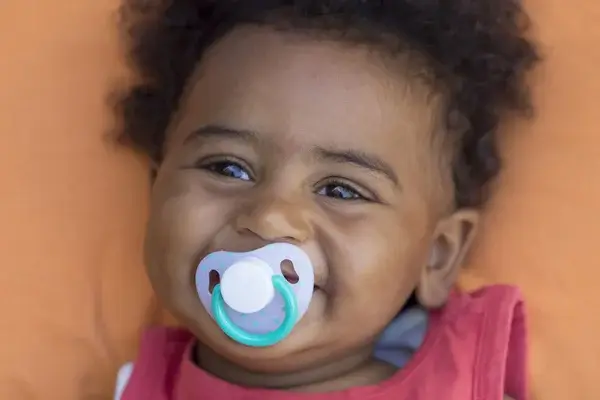Why kids do it and how to break the habit
Why kids do it and how to break the habit
Many parents are concerned about their child’s pacifier, thumb sucking, or finger sucking habits. They may wonder if it
is harmful, at what age it should stop, or what may happen if it does not stop.
If you are one of these parents, you can rest assured that sucking is a natural reflex for infants. Many children begin
these habits in the womb. After birth, infants may suck on thumbs, fingers, pacifiers, or other objects as a means of
making them feel secure, happy, and to learn about their new world. They may also use an oral sucking habit to help
induce sleep. This is why many young children suck their thumb or pacifier in the evening or at other times when they
are tired.
Prolonged sucking habits may cause problems with proper growth of the mouth and alignment of the teeth. It can also
cause changes in the shape of roof of the mouth.
Children who rest their thumbs or fingers passively in their mouths are less likely to experience oral changes than
those who suck them vigorously. When an active thumb or pacifier sucker removes his or her thumb or pacifier from
the mouth, a popping sound often is heard. This more aggressive sucking can cause problems with primary (baby)
teeth, including but not limited to open bites, flared teeth, and narrowed jaws. These issues may also lead to tongue
thrusting and increased risk of trauma to the front teeth and surrounding tissues.
Breaking the Habit
While both pacifier and finger sucking habits affect the teeth in essentially the same way, pacifier use is often an
easier habit to break. Most children stop habits on their own between ages 2 to 4. The behavior lessens gradually
during this period, as children spend more of their waking hours exploring their surroundings. Peer pressure also
causes many school-aged children to stop placing fingers or pacifiers in their mouths.
If a child does not stop on his or her own, parents should discourage the habit after age 3. However, excessive
pressure to stop can do more harm than good.
Things to Consider
● Instead of scolding a child for a thumb or pacifier habit, offer praise for not doing so.
● Children often suck when feeling insecure. Focus on correcting the cause of the anxiety and comfort the child.
● Reward the child when he or she avoids thumb sucking during a difficult period, such as being separated from
family members.
The pediatric dentist can also help to encourage the child to stop sucking his or her thumb or pacifier and explain what
could happen to the teeth if it continues.
If these approaches do not work, there are many ways to remind your child of the habit not to suck, like putting a sock
or cotton glove over the hand at night. You can disrupt the thumb habit by holding their hand if they try to use it or
introducing another item such as a blanket or special stuffed animal. Introducing hard food, when appropriate, may
also help children connect with normal oral functioning and could encourage them to stop sucking on their own.
If the thumb sucking persists, talk to your child’s pediatric dentist or pediatrician. He or she can suggest more ideas
and even prescribe a mouth appliance or suggest more assertive techniques to stop the habit.
Original source from the American Dental Association



